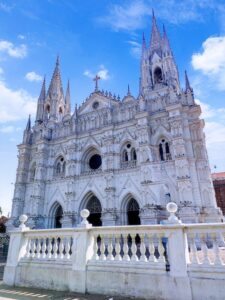El Salvador has rapidly evolved from one of Central America’s most turbulent nations into an emerging investment hub with unique opportunities for expats.
Its dollarized economy, sweeping security reforms, and pioneering digital-asset framework have drawn international attention.
This article explores expat investment advice in El Salvador in 2025, covering the latest changes to the Bitcoin Law, residency and visa routes, taxation, property ownership rules, and the broader economic and regulatory landscape shaping the country’s investment climate.
My contact details are hello@adamfayed.com and WhatsApp +44-7393-450-837 if you have any questions.
The information in this article is for general guidance only. It does not constitute financial, legal, or tax advice, and is not a recommendation or solicitation to invest. Some facts may have changed since the time of writing.

Advantages of Investing in El Salvador as an Expat
El Salvador’s economic transformation is largely built on two pillars: stability and innovation. The US dollar remains the country’s official currency, ensuring low inflation and eliminating foreign exchange risk for investors.
Alongside this, recent government reforms have improved infrastructure and public safety, with homicide rates now among the lowest in the region.
These developments have helped El Salvador shed much of its previous reputation for instability, drawing the attention of expats seeking both investment potential and manageable living costs.
A central part of El Salvador’s international profile has been its experiment with Bitcoin as legal tender.
While initially mandatory for businesses, the 2025 amendment to the Bitcoin Law made acceptance voluntary and removed the requirement for taxes or public payments to be made in BTC.
This recalibration satisfied IMF concerns while preserving El Salvador’s crypto-friendly reputation.
The result is a dual-track system: a dollarized economy that retains all the convenience of US currency, with regulated digital asset opportunities available through the Digital Assets Issuance Law and the National Commission of Digital Assets.
The government has also actively promoted foreign direct investment through special economic zones, free trade regimes, and incentives for renewable energy, tourism, and technology.
Combined with a population increasingly fluent in English and digital skills, El Salvador is positioning itself as a nearshoring and fintech gateway for Central America.
For expats, it offers a rare combination: the fiscal reliability of the US dollar, the flexibility of modern crypto regulation, and the cost advantages of a developing market on the rise.
How to Invest in El Salvador as an Expat
Expats can invest in El Salvador through several straightforward entry points, including:
- Real estate acquisitions – purchasing residential, commercial, or tourism properties in coastal cities or urban centers.
- Business formation – setting up a local company under Salvadoran law to operate in services, manufacturing, or digital industries.
- Residency-linked investments – using rentista, pensionado, or company-based visa pathways that permit long-term residence and legal investment activity.
- Digital asset ventures – taking advantage of the Digital Assets Issuance Law (LEAD) for crypto or fintech businesses.
- Portfolio diversification – investing indirectly through Salvadoran equities, bonds, or regional funds that include El Salvador exposure.
The country’s dollarized system removes currency conversion barriers, while recent tax reforms make inbound capital transfers more efficient. Foreigners can hold assets, establish businesses, and own urban property in their own names without requiring a local partner.
Because the economy operates fully in US dollars, investors also avoid currency volatility and exchange fees common elsewhere in Latin America.
Moreover, inbound remittances and investment funds are tax-exempt upon entry under 2024 fiscal reforms, allowing expats to move capital more freely into local accounts or enterprises.
However, local bureaucracy and due diligence requirements still demand careful preparation. Most foreign investors work with local counsel or fiduciary agents to manage land purchases, corporate registrations, and tax filings.
Does El Salvador use Bitcoin and cryptocurrency?
Yes, El Salvador remains the world’s most visible crypto experiment, but by 2025 it has entered a more regulated and balanced phase.
The Bitcoin Law, first enacted in 2021, was amended in 2025 to make Bitcoin acceptance voluntary rather than mandatory.
Businesses and government offices are no longer required to accept BTC or pay taxes in it, but Bitcoin still retains its legal tender status.
This adjustment aligns the country with IMF requirements while preserving its reputation as a digital-asset-friendly jurisdiction.
For expat investors, this shift means El Salvador now offers clearer, more stable conditions for crypto-related activities. The Digital Assets Issuance Law (LEAD) established a detailed regulatory structure for issuing and trading digital assets.
Overseen by the National Commission of Digital Assets (CNAD), LEAD defines licensing standards, disclosure requirements, and tax exemptions for approved issuers and service providers.
Can Foreigners Buy Property in El Salvador?

Foreigners can freely purchase urban property in El Salvador, including homes, apartments, and commercial buildings. However, the Constitution places clear limits on rural land ownership.
Non-Salvadorans can only buy rural property if citizens of El Salvador enjoy reciprocal rights in their home country, and even then, ownership is capped at roughly 245 hectares per individual or entity.
Land considered rural is classified as agricultural or undeveloped territory outside municipal boundaries, while urban land includes areas zoned for residential, commercial, or mixed use.
Foreign buyers should always conduct full due diligence before purchasing.
Title verification, cadastral surveys, and municipal clearance are essential, as some properties may still have unclear boundaries or outdated records.
Most expats hire a local attorney or notary public to confirm ownership, draft purchase agreements, and handle registry filings.
Coastal and tourism-related real estate has drawn the strongest expat demand, particularly in areas like La Libertad, El Zonte, and Santa Ana.
Prices remain competitive compared with other Central American destinations, and infrastructure improvements especially in roads and utilities have increased liquidity in the market.
For security and value retention, it’s best to prioritize titled urban land, avoid speculative rural parcels, and work with reputable developers or agencies familiar with foreign ownership procedures.
El Salvador Visa Options for Expats
El Salvador offers several residency routes for expats who wish to live or invest, including rentista, pensionado, and investor visas, plus newer options like the freedom visa. These can lead to permanent residency after continuous stay.
- Rentista Visa (Passive Income)
Designed for expats who can demonstrate stable passive income, such as dividends, rental income, or investment returns. The minimum is roughly US$1,500 per month, supported by financial statements or bank records. This visa is ideal for investors living off portfolio income or real estate abroad. - Pensionado Visa (Retiree Program)
Intended for retirees receiving at least US$1,100 per month in pension or retirement income. Holders can import personal effects duty-free and enjoy simplified renewal procedures. It is one of the most popular routes among North American and European retirees. - Investor or Business Owner Visa
Foreigners can establish a company or invest in an existing Salvadoran enterprise to qualify for temporary residence. There is no fixed minimum investment threshold, but applicants must show that their venture contributes to local employment or economic activity. Businesses operating under Free Trade Zone or International Services regimes often receive faster processing due to their economic significance. - Digital Nomad and Freedom Visa
A newer route aimed at high-net-worth or crypto-affluent applicants. Reports suggest investment requirements starting around US$1 million in BTC or equivalent, though criteria vary and official procedures are evolving. Investors using this route typically qualify under the Digital Assets Issuance Law (LEAD) framework for technology or financial innovation projects. - Temporary and Permanent Residency Transition
Most visas are issued for one to five years and are renewable. After continuous lawful residence—generally five years—foreigners may apply for permanent residency, which removes renewal requirements and allows more flexible property and business activities.
Residency procedures are handled by the General Directorate of Migration and Foreign Affairs (DGME). While documentation standards have improved, processing can still be bureaucratic, so early legal guidance is recommended.
For investors, securing residency not only simplifies banking and taxation but also establishes a stable legal foundation for long-term participation in the Salvadoran economy.
How to Open a Bank Account in El Salvador as a Foreigner
Opening a bank account in El Salvador as an expat is possible but the process differs slightly between banks. Most require in-person applications and Spanish-translated documentation if issued abroad, along with local AML and KYC compliance.
Typical requirements include:
- Valid passport and entry visa or residence card.
- NIT (Número de Identificación Tributaria) — a Salvadoran tax identification number issued by the Ministry of Finance.
- Proof of local address, such as a lease agreement or utility bill.
- Bank or professional reference letter from your home country or current financial institution.
- Documentation showing the origin of funds, especially for large deposits or business accounts.
Expats with temporary or permanent residency usually face fewer restrictions and can open checking or savings accounts in US dollars.
Non-residents may still open certain accounts, but these often come with higher minimum balances and tighter transaction limits.
El Salvador’s dollarized economy means all major accounts, loans, and card transactions operate in USD, eliminating exchange-rate risk.
Most banks such as Banco Agrícola, Banco Cuscatlán, and Davivienda offer modern online banking, debit cards, and investment products.
However, compliance departments are strict about documentation, especially for foreigners bringing funds from offshore jurisdictions or crypto-related businesses.
Expat Taxes in El Salvador
El Salvador follows a source-based taxation system, meaning individuals and companies are only taxed on income generated within the country. Foreign-sourced income is not taxed, making it advantageous for expats who earn abroad but live locally.
Individual taxation:
- Residents (those staying more than 200 days per year) pay progressive income tax rates of 0% to 30% on Salvadoran-source income.
- Non-residents are taxed at a flat 30% on income derived from Salvadoran activities.
- Capital gains are taxed at 10%, or at ordinary income rates if assets are sold within 12 months of acquisition.
- Value-Added Tax (VAT) stands at 13%, applicable to most goods and services.
Companies pay 30% corporate income tax on local earnings.
However, entities operating under Free Trade Zone or International Services laws can qualify for multiyear exemptions from income tax, VAT, and import duties. These incentives particularly benefit export-oriented, manufacturing, and tech sectors.
Meanwhile, under the Digital Assets Issuance Law, issuers and service providers enjoy exemptions from most taxes, including income, VAT, and municipal levies.
This framework allows crypto and fintech entrepreneurs to operate under formal supervision from the National Commission of Digital Assets while maintaining favorable tax status.
It should also be noted that a 2024 reform permanently exempted remittances and inbound investment funds from taxation upon entry into El Salvador.
This encourages both expats and Salvadorans abroad to channel capital legally into property or business ventures without triggering additional tax burden.
Pained by financial indecision?

Adam is an internationally recognised author on financial matters with over 830million answer views on Quora, a widely sold book on Amazon, and a contributor on Forbes.
Pained by financial indecision?

Adam is an internationally recognised author on financial matters with over 830million answer views on Quora, a widely sold book on Amazon, and a contributor on Forbes.



